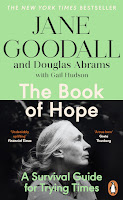 |
| (Amazon UK link) |
What an amazing book it is! I see that some reviewers on Amazon didn’t like the conversational style, punctuated with wee drams of whisky, and cups of coffee, and general chat - but I found it quite appealing. It’s a good way of breaking up the information which, in some cases, is distinctly heavy-going.
The official author of the book is in fact Douglas Abrams, and Gail Hudson is mentioned as a collaborator too. But the content is almost entirely Jane Goodall’s. She’s a naturalist who is now in her late 80s. Yet she still travels the world talking and writing about ecology, animal rights, climate change and more. In her younger days she did extensive work with chimpanzees in the wild, gaining their trust and discovering how intelligent they are. Now she speaks for all animals and plants, as well as humans. She is very concerned about the rampant destruction of so much of the environment.
Yet it’s not a book of warning, but a book of hope. Douglas Abrams asks her more than once why she is hopeful when we see so much devastation around us, and she is able to give four good reasons why she sees the potential for reversing some of the damage, although she insists that there is only a small window of time in which to do so.
The conversations that form the bulk of this book began in 2018 and continued at the end of 2019, pausing during the pandemic and resuming via video chat. Abrams asks questions, Goodall responds with examples, anecdotes and scientific background to much of what she says. The style is friendly and informal, and I found that the two different characters became quite distinct in my mind; I don’t know how much the actual conversation was edited, of course, but it comes across as well-explained and believable.
Now in 2023, two years after the publication of this book, I wonder if the ‘window’ for change has already passed. This year saw the hottest July on record and a huge number of wildfires and hurricanes - quite apart from more and more wars, protests and riots. But I’m still encouraged by the book to have hope: it’s explained, early in the book, that ‘hope’ is not the same as optimism, or, indeed, faith. Hope sees the devastation and problems, acknowledges them, but still finds a reason to believe that things may get better.
Much is made of the responsibility of every individual to do their bit towards reversing some of the terrible things that have happened to the environment. Someone like Jane Goodall has done a great deal to inspire and encourage young people to be more ecologically aware; and it’s the young people of today who are going to be most affected by changes, whether positive or negative. Others of us can do very little; but there’s value in - for instance - remembering to recycle, where possible, or reducing the amount of meat we eat, or simply becoming a bit more efficient about using up our leftover food rather than throwing it out.
I’m very glad I read this book, which has brought some quite serious issues to the fore, in this relatively light and friendly style. I see it’s a New York Times bestseller, so hopefully, along with other books by or about Jane Goodall, it’s reaching a significant audience.
Highly recommended.
No comments:
Post a Comment